Choosing egg donation as a fertility treatment is never an easy decision. When this choice also involves traveling to another country, concerns naturally increase. Questions about treatment quality, legal regulations, costs, communication barriers, and the overall process often make patients hesitate. This is completely understandable.
Iran has become one of the most trusted destinations for egg donation, and Raadina Health is here to make this complex journey clear, safe, and manageable step by step.
Why Choose Iran for Egg Donation?
Since Iran is an Islamic country, many Muslim couples prefer to choose an Iranian donor to help them with their fertility problem. Also, numerous experienced fertility physicians in Iran perform and observe egg donation operations in well-equipped clinics. Last but not least, the cost of egg donation in Iran is almost $4,000, while in the U.S., it is nearly $10,000. Altogether, Iran is a proper destination for donating or getting an egg, especially for Muslims and patients who have tried other fertility treatments often.
A message from one of the foreign patients who came to Iran for egg donation through our company:
Why Iran Is a Trusted Destination for Egg Donation
Iran has gained international recognition in fertility treatments due to several key factors:
- Highly experienced fertility specialists working in advanced IVF clinics
- Clear legal frameworks for assisted reproductive treatments
- Affordable treatment costs compared to many other countries
- Shorter waiting times for egg donation procedures
These advantages make Iran a reliable and accessible option for patients seeking egg donation abroad.
Greetings. I hope this message finds you well. I'm from Australia. A few months ago, I made the decision to travel to Iran to undergo the process of egg donation, and thanks to your guidance and support, I am thrilled to share that the outcome of our embryo transfer has been incredibly positive. Today, I had the opportunity to go for an Anomaly scan, and I was overwhelmed with joy as I witnessed the beating heart and saw some of the tiny body parts of my son. This milestone would not have been possible without your unwavering dedication and commitment to my well-being. Your compassionate approach and the depth of your knowledge have been invaluable in making this dream a reality. I am truly grateful for your expertise, kindness, and the extraordinary level of care you have provided every step of the way. Thank you for being an integral part of this life-changing journey and for helping me experience the joy of this precious moment.
Cost of IVF with Donor Egg in Iran
The cost of IVF with donor eggs in Iran depends on the facilities of the fertility hospital, required medications, pre- and post-operation tests, the donor's medical and psychological evaluations, egg donor compensation, and the reputation of the fertility doctor. On average, the cost of IVF with egg donation in Iran ranges between 4,000 to 5,000 USD.
Egg Donation Timeline in Iran
The egg donation procedure involves five steps which are mentioned the following:
Finding a donor: fertility clinics have egg donors' and recipients' personal and medical records. So, the infertile couple can choose the donor that matches them the best.
Evaluation: once the donor and recipients have matched, both parties should take several medical and psychological tests to ensure the baby is physically and mentally healthy.
Making a contract: if the evaluations are satisfactory and the doctor approves the health condition of the donor and the recipients, they should make a legal contract.
Preparing for the process: in this phase, the donor and female partner should take hormonal medications to prepare their bodies for donating and receiving the egg(s).
Starting the procedure: the donor takes ovulation induction drugs to produce more mature eggs. During this step, the doctor will repeatedly monitor the donor with ultrasound and blood tests to ensure she responds to the medications as expected.
Best Candidates for Using Donor Egg in Iran
There are numerous terms for donating eggs, such as being between the age of 21 to 35, not having life-threatening diseases, having a clear medical history, not having STDs and genetic disorders, etc.
On the other hand, the female recipients who use donor eggs usually have one of the following problems:
- Being between the age of 35 to 45;
- Not being able to conceive naturally;
- Having premature menopause;
- Having lost both ovaries due to chemotherapy, radiotherapy, or trauma;
- Congenital absence of ovaries (ovarian agenesis);
- Not responding well to ovulation induction drugs and ART techniques such as IVF and ICSI in the past;
- Having low ovarian reserve;
- Poor quality of eggs;
- Having genetic disorders;
- Having a history of repeated miscarriages.
Getting Pregnant by Donated Egg in Iran
In Iran, couples who want to use donor eggs should consult a fertility and IVF specialist. Since egg donation is a complicated procedure, they must consider all aspects, including psychological, psychological, legal, etc.
Before transferring the embryo to the uterus, the egg receiver should take medications such as birth control pills to postpone ovulation. After a few weeks, the doctor will check her uterine wall to see if she is ready for pregnancy. Then, three to five days after fertilizing an egg with sperm, the doctor inserts one or two embryos into her uterus. In general, the whole process of getting pregnant with egg donation in Iran takes four to six weeks.
Success Rate of Pregnancy with Donor Egg in Iran
The pregnancy success rate with a donated egg depends on the embryo's quality, the donor's age and the number of embryos transferred. The success rate with fresh donated eggs is about 50%, while the success rate with frozen eggs is more than 40%. Also, remember that using donor eggs and transferring more than one embryo to the uterus can increase the chance of having multiple pregnancies. 40% of cases where donor eggs are used lead to multiple pregnancies.
I Want to Get Fertility Treatment with Donor Egg in Iran; What's Next?
To arrange your trip to Iran for fertility treatment with a donor egg or sperm, contact Raadina Team. Raadina Co. can provide you with the best fertility packages, including accommodation, transfer, medical visa, and legal documents for using donor egg/sperm. Also, if you need an appointment with a fertility doctor or a medical lab, our experienced team can help you book one.
The Role of Raadina Health; Making the Treatment Journey Simple and Trustworthy
For international patients, challenges go beyond medical treatment—travel, language barriers, coordination, and uncertainty can all be stressful.
This is where Raadina Health plays a key role, ensuring a smooth, transparent, and stress-free experience.
From the very beginning, Raadina Health carefully reviews your medical file and honestly determines whether egg donation is the right option for you. Every step is explained clearly before travel, with no unrealistic promises or hidden details.
How Egg Donation Is Performed at Raadina Health
The process begins with a comprehensive medical consultation and full review of your history. A suitable donor is then selected based on strict medical criteria. Treatment cycles of the donor and recipient are carefully synchronized, the uterus is prepared, and embryo transfer is performed at the optimal time.
Throughout the entire journey, the Raadina Health team stays by your side—from the first consultation to the final outcome and beyond.
An International Patient’s Experience; When Hope Returns
Laila, 37, from Kuwait, had undergone several unsuccessful IVF cycles after years of trying to conceive. Her greatest concern was not only the outcome, but whether she could trust a new treatment path.
During her free online consultation with Raadina Health, she felt truly heard for the first time. The medical team clearly explained why previous treatments had failed and why egg donation was the most suitable option for her condition.
When she arrived in Iran, everything was already arranged: medical visa, accommodation, medical interpreter, and full coordination. Laila says the sense of calm and security during treatment was just as important as the result.
A few weeks later, her pregnancy test was positive, and she returned home filled with hope and confidence.
Egg Donation Costs; Transparent and Truly Affordable
The cost of egg donation in Iran—especially through Raadina Health—is significantly lower than in Europe, North America, and even some regional countries. In many foreign clinics, costs are calculated separately and often include unexpected additional fees.
At Raadina Health, costs are explained clearly from the start and include the main treatment stages, allowing patients to make informed decisions without financial stress.
Special Services for International Patients
Raadina Health is more than a medical coordinator—it is your partner throughout the entire treatment journey.
- Our services include:
- Free online consultation before travel
- Assistance with medical visa
- Airport transfer and transportation
- Accommodation near the medical center
- Medical interpreter and companion
- Follow-up care after embryo transfer
Everything is designed so you can focus solely on treatment and results.
Patient Experiences with Raadina Health
Many patients come to us feeling overwhelmed and uncertain.
One patient shared that her biggest concern was understanding the process and communicating with the clinic. With Raadina Health’s guidance, she felt informed, supported, and confident at every stage.
Another patient emphasized how reassuring it was to have a single team managing everything-from medical coordination to accommodation-allowing her to focus entirely on her treatment.
These experiences reflect our commitment to clarity, empathy, and continuous support.
Your Egg Donation Journey with Raadina Health – Step by Step
1. Initial Contact
Reach out to us for a free and confidential consultation.
2. Case Review
Our team reviews your medical background and treatment needs.
3. Personalized Treatment Plan
We recommend suitable options and coordinate with trusted fertility clinics.
4. Travel & Treatment Coordination
Visa, accommodation, appointments, and logistics are arranged seamlessly.
5. Ongoing Support
We stay with you throughout the entire process until treatment completion.
Free Consultation; Your First Step Without Commitment
If you are unsure whether egg donation is right for you or feel stuck in your fertility journey, a free consultation with Raadina Health can be the right starting point.
Your medical file will be reviewed, options explained honestly, and decisions made with confidence and peace of mind.
Contact Raadina Health today for a free consultation and detailed information.
FAQs about Egg Donation in Iran
Is egg donation invasive?
Yes. Egg donation is an invasive procedure with some risks and side effects; however, most donors will recover from the complications of egg donation soon after egg retrieval.
Is egg donation painful?
Not at all. Egg donation is made under anesthesia so that you won't feel any pain during and after it.
Does egg donation affect future fertility?
So far, no investigation has confirmed the relationship between egg donation and infertility. As a result, you will not have any problem getting pregnant after egg donation.
Does the use of donated eggs cause weight gain?
During the egg donation process, the donor takes hormonal medications and ovulation induction drugs, all of which cause accumulation of fluid in ovaries and bloating. Thereby, the egg donor will receive a temporary gain of several lbs. But, after the first menstrual cycle, the ovaries will shrink, and the donor will lose the gained weight without much effort.
Can donor eggs be used in surrogacy?
Yes. Women over 45 who don't have mature eggs and those incapable of carrying the child in their uterus due to genetic and congenital disorders can use this method. In surrogacy with a donor egg, the egg is fertilized in the laboratory through the IVF method, and then, the resulting embryo is transferred into the surrogate's womb.

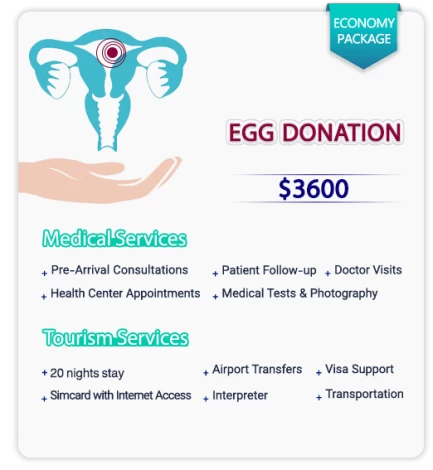
 WhatsApp
WhatsApp
 Telegram
Telegram
 Facebook
Facebook
 Email
Email

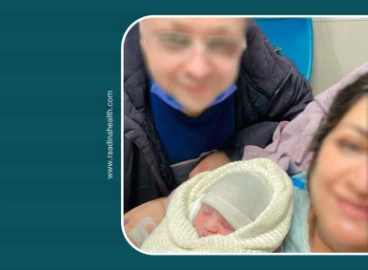
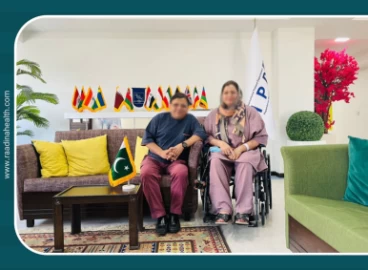
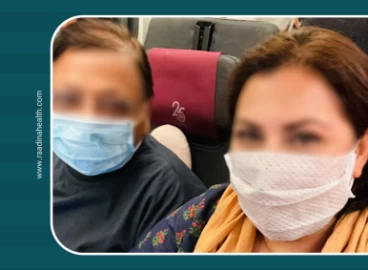
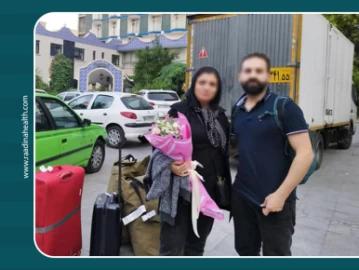

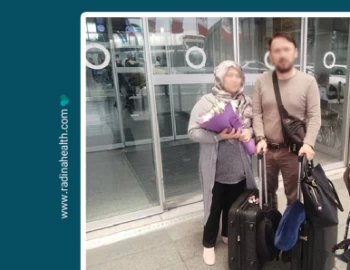


comments
10 comment
User
How to contact you
Habib Ebrahimi
You can contact us with whats app: +989052510125
User
I am happy with service provided by Raadina health, IVF with its all procedures, accomodation, guide, transportaions, reliability nad even helping with the touring around the city and attractions. Kind, reliable, punctual with 24/7 availability to communicate.
Nooshin Dehghan
Thanks a bunch sir. Wish u the best and success best . We ,as a team ,are so happy and it's an honor due to ur positive result
User
Hi. I'm 39 and my wife is 40. We've been trying to have children for over a year. Could we consider an egg donor? What is the upper age limit for treatment with donor eggs?
Habib Ebrahimi
Hello dear friend. Yes, you and your wife could consider using an egg donor to increase your chances of having a child. The upper age limit for treatment with donor eggs varies depending on the fertility clinic and country, but it is generally around 50-55 years old. However, it is best to consult with a fertility specialist to determine if this is a viable option for you and your wife. They can also provide more information on the process and potential success rates.
User
For donor eggs are there any pictures of donors, family and personal backgrounds, .. available to help decide which donor we want to choose? Is it possible to send donor eggs out of Iran to other countries? If yes, to which countries can you send it?
فاطمه وجهی
hi. thanks for contacting us. our expert team can give you free consultation. Contact us on WhatsApp:
(+98)902 692 1957
User
hello. Would I be able to travel with the fertilize eggs ? If so what is the protocol ?
کارشناس رادینا سلامت
Dear user,
if you mean you have frozen embryos, you can transfer them. Talk to the airport you are traveling.